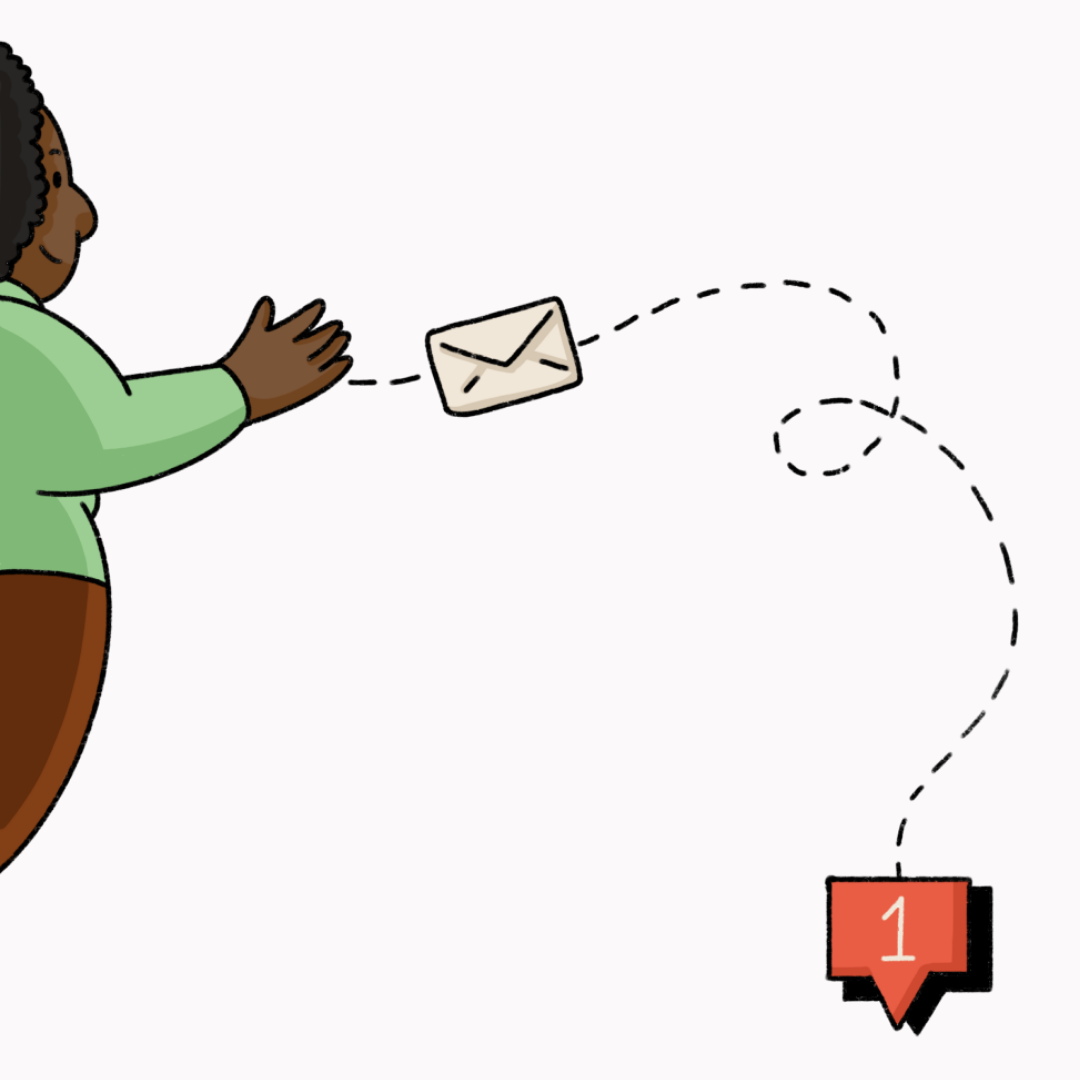Written by: Tasha Falconer (she/her), Jill Koebel (she/her)
Edited by: Etienne Maes (he/him).
Summary: This article, based on a conversation with Amy Prescott (she/xe), an abortion doula with Abortion Support Services Atlantic (ASSA) in Halifax, NS, explains exactly what abortion doulas do. Amy also notes some common misconceptions and barriers she has noticed while working in this field. In addition to volunteering as a doula with ASSA, Amy works at the Halifax Sexual Health Clinic as a medical office administrator. Between these two roles, xe is often the first contact for people looking for abortions.
You might have heard of a birth doula; a person trained to provide support to a pregnant person before, during and after the birth of their child. But what is an abortion doula?
Scope of practice
Amy explained that abortion doulas “provide guidance and support to people accessing various forms of abortion care.”
When starting in this position Amy was surprised at the lack of knowledge the folks she interacted with had about sexual health in general. “A lot of people are actually very unaware of the nuances of their own bodies and the type of reproductive care that they can access,” xe says. As such, often the job of an abortion doula is to provide some of that education. Amy emphasized the importance of meeting folks at the level they are at and recognized that each person she meets brings with them unique life experiences that affect the way they interpret sexual health. Further, she noted that while the need for abortion impacts people of all identities, for “people who are of lower socioeconomic status, people who are newcomers to Canada, people who maybe don’t speak English as a first language, it can be really difficult for them to find out the information that they need to know to access abortion care.” In addition, for BIPOC patients who have been historically discriminated against in the health care system, accessing abortion care can result in experiences of lower health outcomes. BIPOC patients may also have concerns with the historical legacy of forced sterilizations in reproductive healthcare settings. Abortion doulas work to alleviate these barriers through comprehensive person-centred and culturally competent education.
Emotional support is another large aspect of an abortion doula’s work. People often want to talk with a doula if they are nervous about receiving an abortion or need support after an abortion. Amy discussed the various states people are at when seeking abortions; some are confident in their decisions and just need logistical information about the process, while others may feel panicked or anxious. A desire to provide this support is what brought Amy into this work. Xe discussed helping friends through the process informally before joining ASSA. This involved “… just being with [a friend]… holding her hand while she got her blood work done and making sure that she went to the appointment. So, it was something that I had always been doing in my personal relationships.”
As there are only a few clinics in Atlantic Canada that provide surgical abortions, folks often come to ASSA for support with transportation. Amy explained “if you’re from Yarmouth, which is [around] 4 hours away, it can be really difficult to get here if you don’t have a means of transportation. So, people who are traveling long distances typically reach out to us for transportation.”
Lastly, Amy explained one of xer favourite parts of the job is the political advocacy work. Recently, she assisted in the circulation of a petition to change the legislation around what images can be used in anti-abortion protests.
Abortion doulas & the reproductive health field
The healthcare system can feel alienating and is very self-directed, Amy explained, which can make accessing information about abortion services difficult. She expressed her desire for clarity around services: “I would just love it to be clear about like hey, if you need an abortion, this is where you go.” Also, xe notes that many people still don’t understand the differences between medical and surgical abortions. Xe states, “It’s not overly complicated, it can be told and taught to people very quickly, it’s just not common knowledge. I don’t think it needs to be this secret information that we don’t share with people.”
Amy discussed how “being able to advocate politically is one area that [abortion doulas] are really able to have an impact.” Xe noted that through an allied health professional approach, abortion doulas can support busy frontline service providers who may have too much on their plate to take on advocacy work.
In Canada, there is a lack of follow-up support provided after an abortion procedure by the public healthcare system. Amy noted this is a gap abortion doulas are able to fill, stating “abortion doulas really have that time and that ability to provide that aftercare support to people, especially people going through that emotional challenge if they are experiencing one. Being able to do that continuing care model and that follow up care that maybe the initial provider wouldn’t have time to provide.” Abortion doulas are particularily important in the follow-up role, and those seeking support may accidentally end up visiting a crisis pregnancy centre (anti-abortion organizations disguised as clinics) offering post-abortion counselling.
When asked about her favourite part of her ASSA training, Amy explained “the trauma informed education that they provided to us really helped me frame how I approach my practice. [It was taught] that trauma is not the event, but the wound that is left by the event.” Xe noted that while traditionally providers are taught about supporting their patient’s trauma, they should be reflective of their own experiences that may affect the care interaction. She explained providers can actually cause harm by not being self-aware. Amy noted that in her work xe is “constantly .. aware of my own privileges and my own identity … making sure that I’m doing everything in my power to make it as accessible to the people that I’m providing to as possible.”
While there are many gaps that abortion doulas can fill, understanding the realities of abortion access in Canada is important for all care providers. Amy notes that “This statistic really stands out to me ..
of people with uteruses, one in three will have an abortion by the time they’re 45, so whether or not you think this is in your scope of care, this is absolutely within your scope of care.”
Misconceptions about abortion
When asked about misconceptions, Amy notes “There is just so much misconception about abortion in Canada … I am overwhelmed by how much people don’t know and how knowledge is stigmatized or hidden … how much this is not taught to people.” Amy also discussed the role sex and gender play in this lack of information.
“If this was another condition that was not gender specific or not specific to the sex you’re assigned at birth, I think it would have a lot more education and traction and information around it.”
Misconceptions about abortion
She emphasized three common myths about abortion and why they are untrue:
1. That abortions increase your risk of breast cancer. “Pregnancy can increase your risk of breast cancer but having an abortion does not”, Amy says.
2. That Plan B is an abortifacient. Xe explains; “Plan B is a contraceptive method that you can actually take five days after a sexual encounter. Plan B is most effective if you take it within 72 hours of having a sexual encounter, but it is effective after five days post sexual encounter.”
3. Positive and negative feelings after an abortion are mutually exclusive. “99% of people who have an abortion say that their number one emotion is relief and that having negative feelings after an abortion can coincide with the positive feelings.” She continues, “For some people it can be this incredibly liberating and validating experience and can be the right choice for you. But at the same time you can also be sad about it… It’s totally normal to have those mixed feelings, and it’s also totally normal to [think] the abortion was the greatest thing I ever did, I’m so happy I had the opportunity to do so.”
Barriers to abortion care in Atlantic Canada
When asked about barriers, Amy identified stigma as “a huge one, just the fear of what abortion care looks like. [This is] a main reason why people may not access an abortion.” She notes that even in sex ed environments, abortion is often not talked about enough and people are left with questions of what to expect.
As noted previously, extensive travel is required in Atlantic Canada to reach an abortion provider; a barrier that is evident in many regions of Canada. In addition to the travel itself, other barriers related to having to travel exist, such as childcare while traveling and taking time off work, said Amy.
Some doctors are not willing to provide prescriptions to medical abortions, while others are not able to preform abortion care at the clinic they work at. Additionally, a health card is needed to get an abortion and it can take up to three months to get one, which is an issue with considering gestational limits. Amy stated that gestational limits “can kind of be arbitrary dates … [and when] the clock is ticking for them to get abortion care, [that] can be very anxiety inducing.” Amy also noted that these limits can lead to people having to travel out of province to get an abortion. In Nova Scotia, it can be difficult to get therapeutic abortions over 16 weeks gestation, whereas in other provinces gestational limits go up to 24 weeks.
Amy mentioned crisis pregnancy centres as being a barrier to abortion care. She explained that some pregnancy centres are “faith-based pregnancy centers that do not refer people to abortions and often promote misinformation.” Xe emphasized how harmful these centers can be, as folks often reach out expecting full spectrum services but are often pushed towards keeping the pregnancy.
In conclusion
This conversation with Amy illustrated the many barriers that still exist for folks accessing abortion in Canada today. Abortion doulas can help close the gaps and help Canadians to navigate the healthcare system and feel supported in the choices they make regarding their reproductive health.



